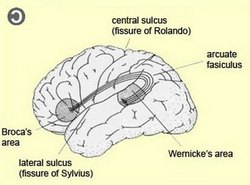|
The term [aphasia] has Greek origins and means "without speech". This pathology was first described by Paul Broca who called it "aphemia". Aphasia is a total and complete loss of speech. Lesser presentations of this condition should be called [dysphasias) from the prefix [dys-] meaning "abnormal", and [phasia], meaning "speech". Aphasia is the lack of spoken speech due to cerebral cortex damage in the dominant brain hemisphere, usually the left side in right-handed individuals. There are two main areas of the brain involved in speech: Broca's and Wernicke's. Broca's area is responsible for speech expression (the spoken and written word). Damage to this area causes expressive or motor aphasia (or dysphasia). Wernicke's area is responsible for the comprehension of speech, the understanding of language. Damage to this area causes receptive orsensory aphasia (or dysphasia). Broca's and Wernicke's areas are connected by an intrahemispheric tract known as the arcuate fasciculus (see image). |
Broca and Wernicke's areas in the dominant brain hemisphere |
| Complete loss of all communication abilities is called global aphasia. Other dysphasia pathologies are:
• Agraphia / dysgraphia: Incapacity / difficulty in writing Image under copyleft agreement courtesy of The Brain from Top to Bottom |
|
| Back to MTD Main Page | Subscribe to MTD |
